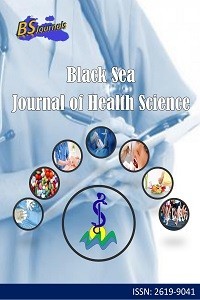Hemşirelik Öğrencilerinin İlaç Dozu Hesaplama ve Matematiksel Bilgi Becerileri ile İlaç Dozu Hesaplama Becerilerinin Öğretimine Yönelik Görüşlerinin Belirlenmesi
Eğitim, Hemşirelik öğrencileri, İlaç dozu hesaplama, Matematik becerisi
Determination of Nursing Students' Views on Teaching Drug Dose Calculation and Mathematical Knowledge Skills and Drug Dose Calculation Skills
Education, Nursing students, Drug dose calculation, Mathematics skill,
___
- Bagnasco A, Galaverna L, Aleo G, Grugnetti AM, Rosa F, Sasso L. 2016. Mathematical calculation skills required for drug administration in undergraduate nursing students to ensure patient safety: A descriptive study: Drug calculation skills in nursing students. Nurse Educ Pract, 16(1): 33-39. doi: 10.1016/j.nepr.2015.06.006. Epub 2015 Jun 24. PMID: 26347449.
- Başar M, Doğan M. 2020. Öğrencilerin Matematik Korkusunun İncelenmesi. Turkish J Edu Stud, 7 (3): 1-26.
- Caboral-Stevens M, Ignacio RV, Newberry G. 2020. Undergraduate nursing students' pharmacology knowledge and risk of error estimate. Nurse Educ Today, 93: 104540. doi: 10.1016/j.nedt.2020.104540. Epub 2020 Jul 21. PMID: 32721649.
- Çelik Z, Şendir M. 2019. Hemşirelik öğrencilerinin farmakolojik bilgi düzeyleri ve ilaç dozu hesaplama becerilerinin değerlendirilmesi. Ordu Hemşirelik Çalışmaları Derg, 2(1): 1-10.
- Fleming S, Brady AM, Malone AM. 2014. An evaluation of the drug calculation skills of registered nurses. Nurse Educ Pract, 14(1): 55-61. doi: 10.1016/j.nepr.2013.06.002. Epub 2013 Jul 4. PMID: 23831386.
- Goedecke T, Ord K, Newbould V, Brosch S, Arlett P. 2016. Medication errors: New EU good practice guide on risk minimisation and error prevention. Drug Saf, 39(6): 491-500. doi: 10.1007/s40264-016-0410-4. PMID: 26940903.
- Goodwin J, Kilty C, Harman M, Horgan A. 2019. "A great stress among students" - mental health nurses' views of medication education: A qualitative descriptive study. Nurse Educ Today, 77: 18-23. doi: 10.1016/j.nedt.2019.03.005. Epub 2019 Mar 21. PMID: 30925342.
- McMullan M, Jones R, Lea S. 2010. Patient safety: numerical skills and drug calculation abilities of nursing students and registered nurses. J Adv Nurs, 66(4): 891-899. doi: 10.1111/j.1365-2648.2010.05258.x. PMID: 20423376.
- Preston P, Leone-Sheehan D, Keys B. 2019. Nursing student perceptions of pharmacology education and safe medication administration: A qualitative research study. Nurse Educ Today, 74: 76-81. doi: 10.1016/j.nedt.2018.12.006. Epub 2018 Dec 22. PMID: 30594903.
- Slawomirski L, Auraaen A, Klazinga NS. 2017. The economics of patient safety. Strengthening a value-based approach to reducing patient harm at national level. OECD Health Working Papers, No. 96, OECD Publishing. https://doi.org/10.1787/5a9858cd-en
- Sulosaari V, Huupponen R, Hupli M, Puukka P, Torniainen K, Leino-Kilpi H. 2015. Factors associated with nursing students' medication competence at the beginning and end of their education. BMC Med Educ, 15: 223. doi: 10.1186/s12909-015-0513-0. PMID: 26683623; PMCID: PMC4683869.
- Vaismoradi M, Griffiths P, Turunen H, Jordan S. 2016. Transformational leadership in nursing and medication safety education: a discussion paper. J Nurs Manag, 24(7): 970-980. doi: 10.1111/jonm.12387. Epub 2016 May 4. PMID: 27144805.
- WHO. 2017. Patient safety: making health care safer. World Health Organization, URL: https://apps.who.int/iris/handle/10665/255507 (erişim tarihi: 15 Mart 2022).
- Yaraş G. 2007. Hemşirelik öğrencilerinin ilaç dozu hesaplama becerilerinin değerlendirilmesi. Yüksek Lisans Tezi, Sağlık Bilimleri Enstitüsü, Cumhuriyet Üniversitesi, Sivas, Türkiye, ss: 68.
- Zopluoğlu CV. 2013. Uluslararası matematik ve fen eğilimleri araştırması (TIMSS) Türkiye değerlendirmesi: Matematik. Setaanaliz, 64: 4-14.
- Yayın Aralığı: Yılda 4 Sayı
- Başlangıç: 2018
- Yayıncı: Cem TIRINK
Hastaların Hastaneye Yatış Anındaki Malnütrisyon Durumunun ve Yaşam Kalitesinin Belirlenmesi
Fatma NİŞANCI KILINÇ, Çiler ÖZENİR, Sevinç EŞER DURMAZ, Aylin BAYINDIR GÜMÜŞ, Biriz ÇAKIR
Nigar ÜNLÜSOY DİNÇER, Emine Pınar KETİ
Demet YAVUZ, Nezaket KADI, Düriye Sıla KARAGÖZ ÖZEN, Melek BİLGİN, Mehmet Derya DEMİRAG
Şizofreni Hastalarında Obezite ve Yeme Bozukluğunu Etkileyen Etmenlerin Değerlendirilmesi
Murat URHAN, Özge KÜÇÜKERDÖNMEZ
Lale DUYSAK, Mine GÜLABOĞLU, Tuğba Nurcan YÜKSEL, Zekai HALICI, Doğukan CANAYAKIN, Galip Mesut DEMİR
Hemşirelik Öğrencilerinde Öz-Duyarlılığın Otantiklik Üzerine Etkisi
Correlation between the Tuffier's Line and the Spinopelvic Parameters
Bifenotipik Akut Lösemili Hastalarda Uygulanan İndüksiyon Tedavilerinin Etkinliği
İbrahim Halil AÇAR, Birol GÜVENÇ
İnme Sonrası Cinsel İşlev Bozukluğunda Hemşirenin Sorumlulukları
Burcu SÜTCÜ, Gülşah ÇAMCI, Hatice KARABUĞA YAKAR, Sıdıka OĞUZ
